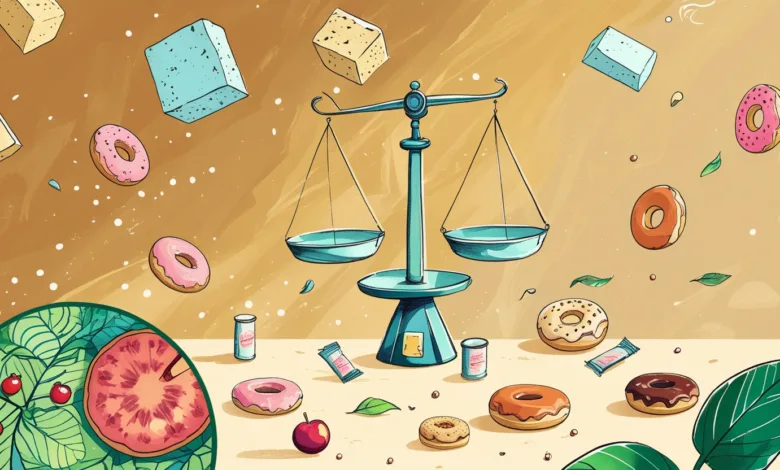The impact of sugar on weight loss and how to reduce sugar intake

Sugar is one of the most widely consumed food additives in the world, and it’s no secret that excessive consumption can lead to a host of health problems. One of the most significant concerns is its impact on weight loss. Many people struggle with weight management, and sugar consumption can contribute significantly to the problem. In this article, we’ll explore the science behind sugar and weight gain, as well as some practical tips on how to reduce your sugar intake. Whether you’re just starting your weight loss journey or looking for ways to fine-tune your diet, understanding the role of sugar in your diet is crucial. So, let’s dive in and learn how to take control of your sugar intake and achieve your health goals.
Understanding the types of sugar
Before we dive deeper into the impact of sugar on weight loss, it’s important to understand the types of sugar. Sugar is a carbohydrate that comes in many forms, including glucose, fructose, and sucrose. Glucose is the primary source of energy for the body and is found in foods like bread, pasta, and rice. Fructose is found in fruits and honey, while sucrose is a combination of glucose and fructose and is commonly found in table sugar.
Another type of sugar that has gained popularity in recent years is high-fructose corn syrup (HFCS). HFCS is a sweetener made from corn and is commonly found in processed foods and beverages. It has been linked to a host of health problems, including obesity, diabetes, and heart disease.
How sugar affects the body
When we consume sugar, it is broken down into glucose and enters the bloodstream, causing blood sugar levels to rise. In response, the pancreas releases insulin, a hormone that helps regulate blood sugar levels. Insulin allows glucose to enter the cells and be used for energy or stored as fat.
However, when we consume too much sugar, our body’s cells become resistant to insulin, leading to a condition called insulin resistance. Insulin resistance can lead to a host of health problems, including type 2 diabetes, heart disease, and obesity.
Sugar also has a direct impact on the brain. When we consume sugar, it triggers the release of dopamine, a neurotransmitter that is associated with pleasure and reward. This is why sugar is often referred to as “addictive” – it activates the same pleasure centers in the brain as drugs like cocaine.

Sugar and weight gain
There is a direct link between sugar consumption and weight gain. When we consume too much sugar, it causes our blood sugar levels to rise, leading to an increase in insulin production. Insulin promotes the storage of fat, particularly in the abdominal area.
In addition, sugar is often found in high-calorie, low-nutrient foods, such as soda, candy, and baked goods. These foods provide empty calories and can lead to overconsumption and weight gain.
Studies have shown that reducing sugar intake can lead to significant weight loss, particularly in the abdominal area. One study found that reducing sugar intake by just 10% resulted in a 2-pound weight loss over 6 months.
The recommended daily intake of sugar
The American Heart Association recommends that women consume no more than 6 teaspoons, or 24 grams, of added sugar per day. For men, the recommended daily intake is no more than 9 teaspoons, or 36 grams.
It’s important to note that this recommendation applies to added sugars, not the naturally occurring sugars found in fruits and vegetables.
Unfortunately, the average American consumes far more sugar than the recommended daily intake. In fact, the average American consumes around 17 teaspoons, or 68 grams, of added sugar per day.
How to reduce sugar intake
Reducing sugar intake can be challenging, especially if you’re used to consuming a lot of sweets and processed foods. However, there are many strategies you can use to cut back on sugar and improve your health.
1. Read food labels: One of the easiest ways to reduce sugar intake is to read food labels. Look for foods that are low in sugar or have no added sugar.
2. Cut back on sugary drinks: Sugary drinks are one of the biggest sources of added sugar in the American diet. Cut back on soda, sports drinks, and fruit juices and replace them with water, unsweetened tea, or sparkling water.
3. Choose whole foods: Whole foods, such as fruits, vegetables, and whole grains, are naturally low in sugar and high in fiber, which can help you feel full and satisfied.
4. Use sugar substitutes: If you must have something sweet, try using sugar substitutes like stevia or monk fruit. These sweeteners are low in calories and won’t spike your blood sugar levels.
5. Cook at home: Cooking at home allows you to control the amount of sugar in your food. Try using natural sweeteners like honey or maple syrup instead of table sugar.
Tips for cutting sugar from your diet
Cutting sugar from your diet can be challenging, but it’s not impossible. Here are some tips to help you reduce your sugar intake:
1. Start small: Don’t try to cut out all sugar at once. Start by reducing your intake gradually and making small changes to your diet.
2. Find healthy alternatives: Instead of reaching for a candy bar or soda, try snacking on fruits, nuts, or seeds. These foods are naturally sweet and provide important nutrients.
3. Keep healthy snacks on hand: Keeping healthy snacks on hand can help you avoid reaching for sugary treats when you’re hungry.
4. Stay hydrated: Drinking plenty of water can help you feel full and satisfied, reducing your cravings for sweets.
5. Get enough sleep: Lack of sleep can lead to sugar cravings, so it’s important to get enough rest each night.
Sugar substitutes and alternatives
If you’re looking for a way to satisfy your sweet tooth without consuming sugar, there are many sugar substitutes and alternatives to choose from. Here are some popular options:
1. Stevia: Stevia is a natural sweetener that comes from the leaves of the stevia plant. It is much sweeter than sugar and has zero calories.
2. Monk fruit sweetener: Monk fruit sweetener is a natural sweetener that comes from the monk fruit. It is low in calories and has been shown to have anti-inflammatory properties.
3. Xylitol: Xylitol is a sugar alcohol that is commonly used as a sugar substitute. It has fewer calories than sugar and is tooth-friendly.
4. Honey: Honey is a natural sweetener that is rich in antioxidants and has antibacterial properties.
5. Maple syrup: Maple syrup is a natural sweetener that is high in antioxidants and minerals.
The benefits of reducing sugar intake
Reducing sugar intake has many benefits for your health, including:
1. Weight loss: As we’ve discussed, reducing sugar intake can lead to significant weight loss, particularly in the abdominal area.
2. Improved heart health: Excessive sugar consumption has been linked to an increased risk of heart disease. By reducing sugar intake, you can improve your heart health and reduce your risk of developing heart disease.
3. Better dental health: Sugar is a major contributor to tooth decay. By reducing sugar intake, you can improve your dental health and reduce your risk of cavities.
4. Reduced inflammation: Sugar consumption has been linked to inflammation in the body, which can contribute to a host of health problems. By reducing sugar intake, you can reduce inflammation and improve your overall health.







